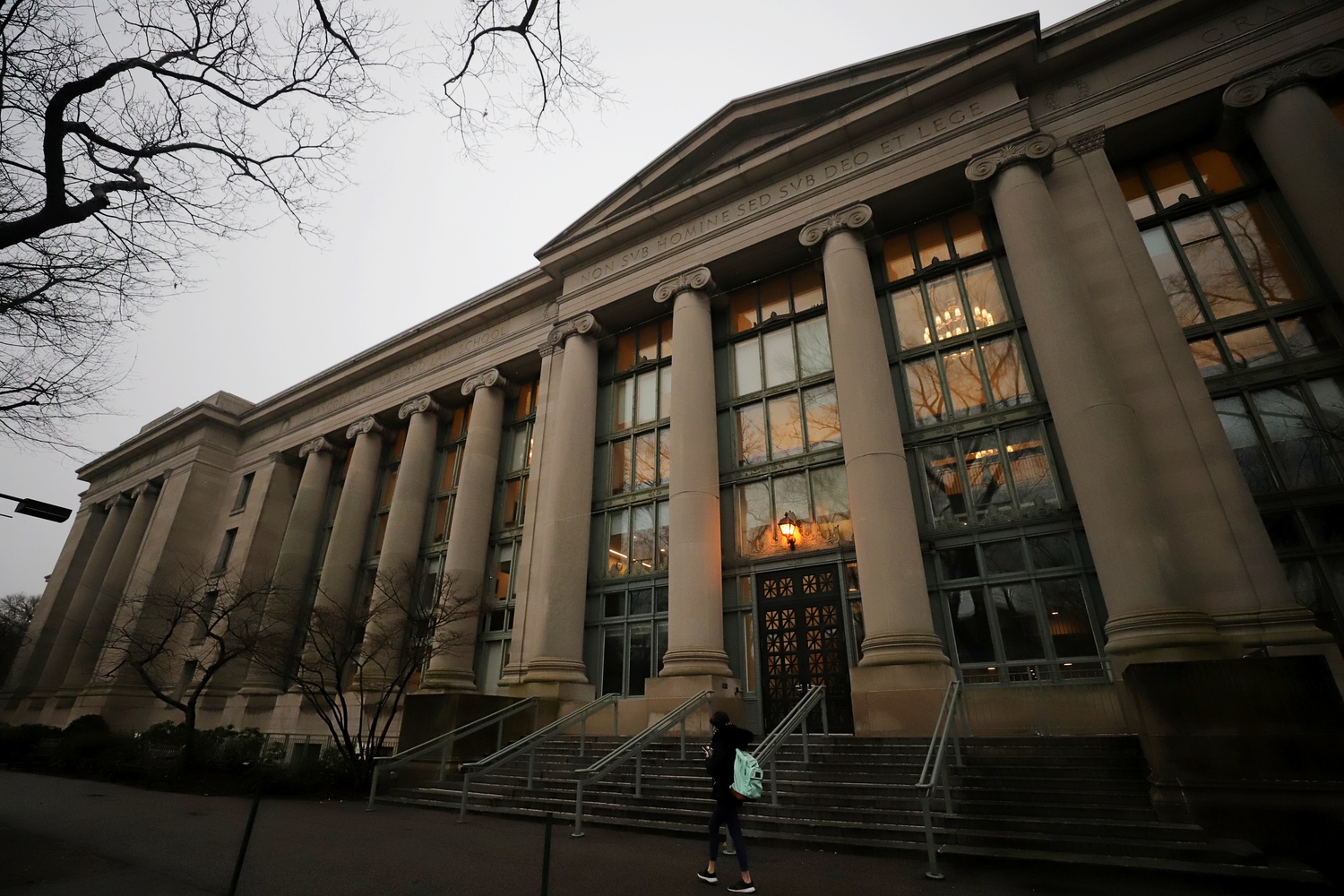
News
Summers Will Not Finish Semester of Teaching as Harvard Investigates Epstein Ties

News
Harvard College Students Report Favoring Divestment from Israel in HUA Survey

News
‘He Should Resign’: Harvard Undergrads Take Hard Line Against Summers Over Epstein Scandal

News
Harvard To Launch New Investigation Into Epstein’s Ties to Summers, Other University Affiliates

News
Harvard Students To Vote on Divestment From Israel in Inaugural HUA Election Survey
Harvard Taught Me to Speak Out. Big Law Fired Me When I Did.
Last month, I was fired from my corporate law job. My offense? An article on the Trump administration’s threats to democracy.
I went to Harvard Law School, where I was taught to think critically and interrogate systems of power. Like the majority of my classmates, I got a job at a big law firm.
But it turns out that the lessons I learned at HLS were never meant to follow me there.
In May, I wrote publicly about the threats to free speech and civil liberties if the federal government and Palantir struck a deal to surveil American citizens. Two weeks later, the New York Times reported they had.
I was warned that speaking out might cost me my job — but I kept writing. Then I was fired.
The incident is an example of a deeper collision — between the values universities purport to instill and the incentives inherent in the careers they most visibly promote.
Harvard equips us with skills like analytical rigor, ethical judgment, and a sense of professional responsibility. Every JD must complete 50 hours of supervised pro bono work. The College’s core curriculum requires students to engage with questions of justice, civic life, and moral reasoning. Service is integrated into the University’s mission.
But in applying those teachings — transparently and in the public interest — I saw firsthand just how incompatible they are with the professional path Harvard provisions.
Institutions like Harvard brand themselves as engines of public leadership and thoughtful dissent, but the professional pipelines they cultivate often function less as launchpads for civic engagement than as filters for deference.
Several publications have noted that HLS actively reinforces the corporate law conveyor belt. For both the school and its students, private-sector placement is the default path.
Corporate law firm recruitment begins just weeks into students’ first year. Firms sponsor on-campus social events, host lavish dinners, and provide staggeringly early offers. The school’s career resources are calibrated for private-sector placement. Meanwhile, public interest career counseling is comparatively underwhelming.
This structural tilt has broader consequences: a kind of quiet moral re-alignment, where professional prestige is increasingly decoupled from the University’s stated purpose. Harvard speaks often of cultivating informed citizens and ethical leaders. It recruits students who are animated by those ideals. Yet, like me, most graduates end up in positions where truth is penalized, dissent is discouraged, and silence becomes a professional asset. My firing is not a failure of execution. It is the natural result of a system working exactly as designed.
This is not a critique of corporate work in itself. For many students — particularly those carrying debt, navigating visa applications, or supporting families — such jobs are not merely attractive but essential. Financial stability matters, and Harvard should support students who pursue those paths.
But supporting paths is not the same as promoting them. When the private career track is illuminated by extensive infrastructure — catered events, glossy programming, and seamless recruitment — and other tracks are underfunded, opaque, or precarious, the result is an ecosystem that appears neutral, while quietly steering. Some values are built into the architecture, while some are left out. Harvard is far from unique in this regard, but its size and influence render the discrepancy harder to ignore.
I took seriously what Harvard emphasized — principles like professional responsibility and measured conviction. But in applying those values I ran headfirst into the limits of the very path I was trained to follow.
I am not advocating a wholesale rejection of the private sector. Nor am I suggesting that all graduates must pursue public interest work. But I ask this: If a university claims to prepare students for ethical leadership, what responsibility does it bear when alumni seeking to embody that mission are penalized for it?
Harvard instills a belief in reasoned discourse, principled advocacy, and the duty to serve the public good. That is a noble pursuit — and one worth preserving. But alongside it, there should be preparation for the difficulty of practicing those ideals. Students should be equipped not only with the tools of analysis, but with the frameworks to navigate what happens when those tools come into conflict with the systems they were trained to enter.
Moreover, speaking out should not be treated as a deviation from professional success, but as part of its fullest expression. If we are serious about training leaders in law and public life, we must reckon with the question: What does it mean to teach ethical conviction if we fail to protect those who act on it?
I didn’t end up in conflict with Harvard’s values — I ended up in conflict with a system where those values were never meant to survive. If the institution is serious about its mission, it must ensure that public-purpose work is not just possible, but supported and respected. And it must stand behind students not only when they succeed within the system, but also when they dare to question it.
Ryan W. Powers is a graduate of Harvard Law School.
Want to keep up with breaking news? Subscribe to our email newsletter.

